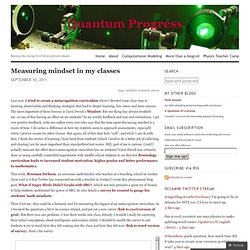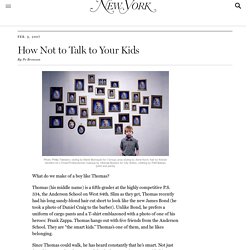

Test Your Mindset. Brain Article.pdf. Measuring mindset in my classes. Last year, I tried to create a metacognition curriculum where I devoted some class time to learning about habits and thinking strategies that lead to deeper learning, less stress and more success.

The most important of these lessons is Carol Dweck’s Mindset. But one thing has always troubled me—is any of this having an effect on my students? In my weekly feedback and year end evaluations, I get very positive feedback, with one outlier every year who says that the time spent discussing mindset is a waste of time.
I do notice a difference in how my students seem to approach assessments, especially when I proctor exams for other classes. But again, all of this data feels “soft”, and while I am ok with that, I think the stories of learning I hear back from students (which I need to do a better job of collecting and sharing) are far more important than standardized test scores. Then it hit me—this could be a fantastic tool for measuring the impact of my metacogntion curriculum. Like this: The Power (and Peril) of Praising Your Kids.
What do we make of a boy like Thomas?

Thomas (his middle name) is a fifth-grader at the highly competitive P.S. 334, the Anderson School on West 84th. Slim as they get, Thomas recently had his long sandy-blond hair cut short to look like the new James Bond (he took a photo of Daniel Craig to the barber). Unlike Bond, he prefers a uniform of cargo pants and a T-shirt emblazoned with a photo of one of his heroes: Frank Zappa.
Thomas hangs out with five friends from the Anderson School. They are “the smart kids.” Since Thomas could walk, he has heard constantly that he’s smart. But as Thomas has progressed through school, this self-awareness that he’s smart hasn’t always translated into fearless confidence when attacking his schoolwork. For instance, in the early grades, Thomas wasn’t very good at spelling, so he simply demurred from spelling out loud. Thomas is not alone. When parents praise their children’s intelligence, they believe they are providing the solution to this problem. CLASS Index. Welcome!

The CLASS (Colorado Learning Attitudes about Science Survey) is part of the PhET (Physics Education Technology) Project and the PER@C (Physics Education Research Group at Colorado). Over the last decade, researchers in science education have identified a variety of student beliefs that shape and are shaped by student classroom experience.1,4,5,7 Based on studies of students' beliefs, researchers have developed instruments designed to probe these beliefs.8 Version 3 created for use during the Fall semester of 2004 can be found in both HTML and PDF formats by clicking below. WebAssign ID number 1222349 "Beliefs about Physics Survey" courtesy of Danny Caballero, Georgia Institute of Technology Physics Education Research Group. Update: The CLASS has now been adapted to and validated for use in Chemistry (CLASS-Chem) and Biology (CLASS-Bio)! Analysis Papers: Who Becomes a Physics Major? This project is funded by: ** Several of the questions are drawn directly from the MPEX6 1. 2. 3. 4. 5.
Grit Scale. Mindset Works®: Student Motivation through a Growth Mindset, by Carol Dweck, Ph.D.